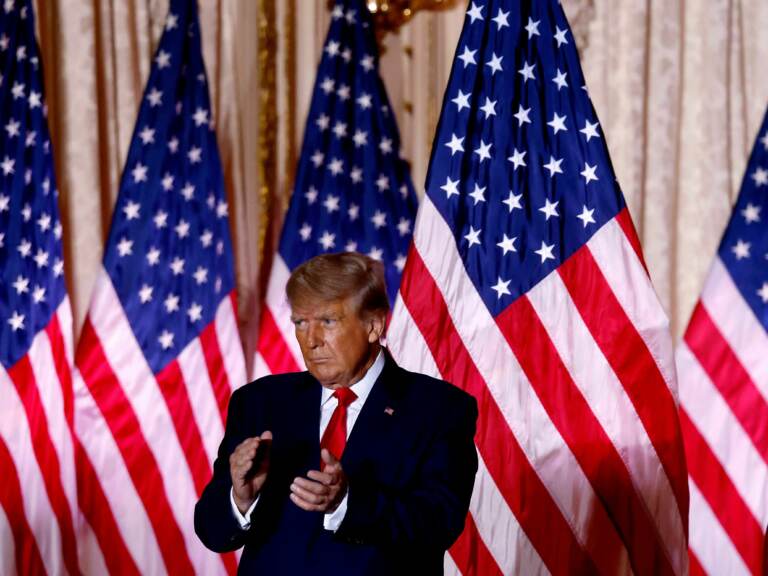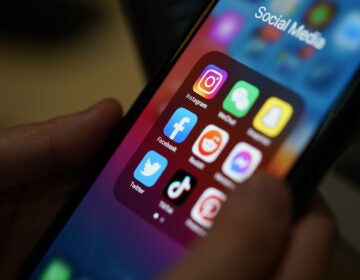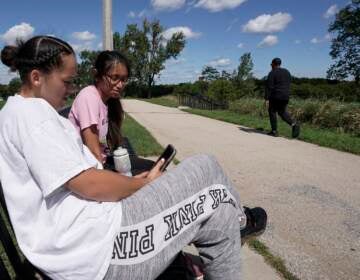Meta allows Donald Trump back on Facebook and Instagram

Suspending former President Donald Trump's account was the most high-profile and controversial content moderation decision Facebook parent Meta has ever made. (Alon Skuy/AFP via Getty Images)
Former President Donald Trump will be allowed to return to Facebook and Instagram more than two years after he was banned for inciting violence when his supporters stormed the U.S. Capitol on Jan. 6, 2021.
Trump’s accounts will be reinstated “in the coming weeks” with new guardrails “to deter repeat offenses,” Nick Clegg, president of global affairs at Facebook’s parent company Meta, said on Wednesday.
The “serious risk to public safety” that led Meta to suspend Trump in January 2021 “has sufficiently receded,” Clegg wrote in a blog post. Still, he said, Trump would face “heightened penalties” should he continue to break Meta’s rules, including removal of his posts and even a fresh two-year suspension.
“The public should be able to hear what their politicians are saying – the good, the bad and the ugly – so that they can make informed choices at the ballot box. But that does not mean there are no limits to what people can say on our platform,” Clegg said.
Trump’s suspension was controversial, and so is his reinstatement
Suspending Trump’s account was the most high-profile and controversial content moderation decision Meta has ever made. Now its move to reinstate him thrusts the company back into the middle of a contentious debate over tech platforms’ power to determine who gets a voice online.
In a statement on Truth Social, the company Trump helped create and financially back, the former president said: “FACEBOOK, which has lost Billions of Dollars in value since ‘deplatforming’ your favorite President, me, has just announced that they are reinstating my account. Such a thing should never again happen to a sitting President, or anybody else who is not deserving of retribution!”
Trump’s campaign had formally petitioned Meta to reinstate him, saying the ban had “dramatically distorted and inhibited the public discourse.”
Meta’s announcement drew immediate blowback from civil rights and advocacy groups.
“[Meta CEO] Mark Zuckerberg’s decision to reinstate Trump’s accounts is a prime example of putting profits above people’s safety,” said NAACP President Derrick Johnson. “It’s quite astonishing that one can spew hatred, fuel conspiracies, and incite a violent insurrection at our nation’s Capitol building, and Mark Zuckerberg still believes that is not enough to remove someone from his platforms.”
Wendy Via, president of the Global Project Against Hate and Extremism, warned Trump’s reinstatement will reverberate worldwide.
“Authoritarian-leaning politicians everywhere are watching, and they will celebrate this decision,” she said. “They have already been inspired by Trump’s successful manipulation of Facebook and its lax rule enforcement for the politically powerful. These far-right leaders will simply ramp up their use of Facebook to spread misinformation to build their base, contributing to political violence and an increase in far-right governments.”
Facebook is a powerful fundraising tool for Trump’s 2024 campaign
Whether or how Trump will return to posting on Facebook is unclear. He has not resumed posting on Twitter and has an agreement with Truth Social to post there first.
Meta’s decision to reinstate Trump lands in a social media landscape that has changed markedly in the past two years. Facebook is attempting to reinvent itself as a “metaverse company” in a move away from its social networking origins. In 2022, the company announced declines in revenue and users for the first time.
Twitter is in chaos under the ownership of billionaire Elon Musk, who reversed his platform’s ban on Trump in November after polling the site’s users.
And a raft of alternative social media sites — from Truth Social to Gettr, Parler and Gab — are wooing conservatives who have long accused the bigger networks of muzzling their political views.
Still, regaining his Facebook account, which had 35 million followers when it was suspended, is likely to be a boon as Trump seeks the presidency in 2024. While he famously used Twitter on the campaign trail and in office to announce policy, indulge fans and goad enemies, Facebook was a major engine of his fundraising efforts, generating hundreds of millions of dollars in campaign contributions. (Trump’s campaign page was not affected by the ban and has continued to raise money via Facebook.)
Trump continues to amplify false election fraud claims and other conspiracy theories on social media
Facebook initially suspended Trump indefinitely in the days after the Capitol insurrection. That decision was slammed by the company’s Oversight Board — an outside group of legal experts, human rights scholars, and former journalists and politicians created and funded by Meta — as vague. In June 2021, Facebook revised the penalty to a two-year ban, said it would only reinstate Trump “if the risk to public safety has receded,” and vowed to consult experts before doing so.
At that time, the company also set out new rules for public figures in times of civil unrest and violence. On Wednesday, Clegg said in addition to removing violating posts and suspending Trump if he again breaks the rules, Meta may also limit the distribution of content “that contributes to the sort of risk that materialized on January 6.” For example, it could make those posts only visible if a user went directly to Trump’s Facebook page.
Since his removal from mainstream social media, Trump has used Truth Social as his main mouthpiece. There, he has continued to falsely claim that the 2020 election was stolen from him and amplified the far-right QAnon conspiracy theory to his 4.78 million followers.
The advocacy groups Accountable Tech and Media Matters for America estimated last month that more than 350 of Trump’s Truth Social posts would directly violate Facebook’s rules against QAnon content, false election claims and harassment of marginalized groups.
Democratic lawmakers had urged Meta not to reinstate Trump’s account, arguing that the risk to public safety continues. In a December letter to the company, U.S. Rep. Adam Schiff of California and Sen. Sheldon Whitehouse of Rhode Island pointed to Trump’s posts on Truth Social casting doubt on the integrity of the 2022 midterm elections, continuing to deny his loss in 2020, and amplifying accounts promoting QAnon-tied conspiracy theories.
“We have every reason to believe he would bring similar conspiratorial rhetoric back to Facebook, if given the chance,” they wrote.




